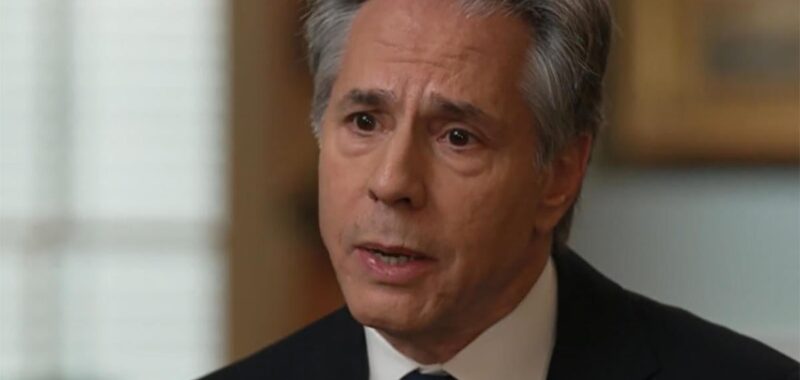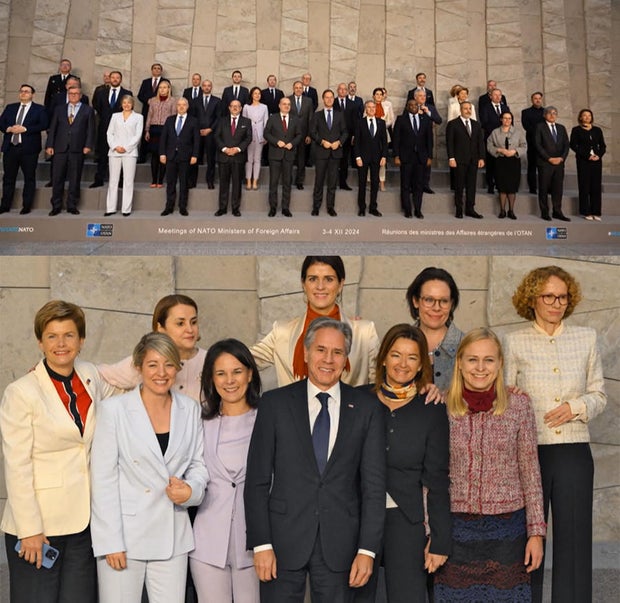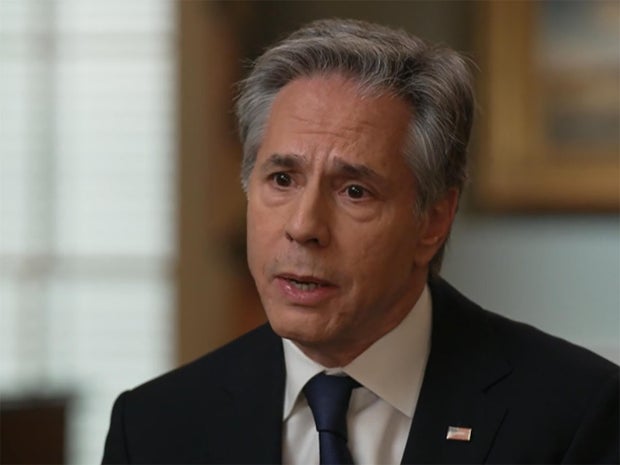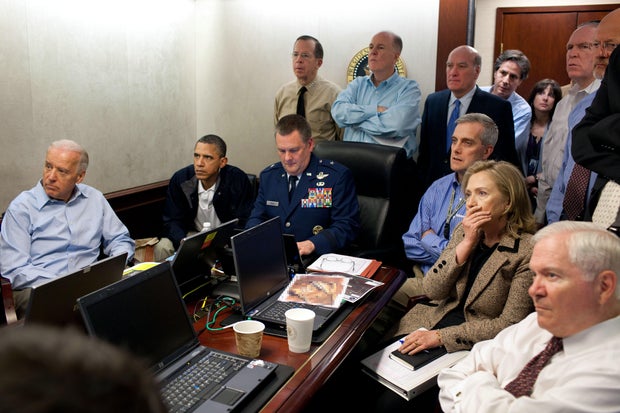No easy stroll to the exit for Antony Blinken. With exactly eight days left as secretary of state, he’s only just concluded what is likely his last trip back-and-forth across the globe, with meetings in Seoul, Tokyo, Paris and, finally, Rome.
Blinken has traveled more than a million miles on the job. “Every minute, every hour, every day of the time that we have left, we’re focused on getting results,” he said.
“Sunday Morning” flew with him in early December – three trips ago – from Washington to Brussels for the most recent NATO foreign ministers meeting. The main topic of discussion was Russian aggression in Ukraine.
“We have a new NATO strategic concept,” said Blinken. “It recognizes Russia as the most direct threat to the alliance.”
But there was a lot of well-wishing going on as well. Blinken stood right in the middle of the so-called “family photo,” and also photo-bombed a portrait of all the women foreign ministers.
CBS News
Mark Rutte of the Netherlands, the secretary-general of NATO, told Blinken, “You have been a staunch ally, and people like you very much.”
All this ceremonial show & tell might be seen as subtle messaging to the incoming Trump administration about the value of nurturing alliance – the “stronger together” argument. Blinken said, “The instruction I got from President Biden on Day One was, get in there, rejuvenate, re-energize, and even re-imagine our alliances and partnerships.”
Here was one more chance for Blinken to hold up the Biden administration foreign policy report card … and his own. He explained, “If the United States is not engaged, if we’re not leading, then probably either someone else is (and probably not in a way that reflects our interests and our values), or maybe just as bad, no one is. What we’ve done over the last four years is, we’ve re-engaged.”
As for Ukraine, he told the press in Brussels, “All told, the U.S. has provided $102 billion in assistance to Ukraine, our allies and partners $158 billion. This may be the best example of burden-sharing that I’ve seen in the 32 years that I’ve been doing this.”
CBS News
President-elect Trump wants to end Russia’s war with Ukraine, critics fear not to Ukraine’s advantage. Ever the diplomat, Blinken won’t say he’s trying to Trump-proof the potential outcome. “For any of us to really speculate at this point, I don’t think makes a lot of sense,” Blinken said. “What does make sense is to make sure that we give the next administration, we give the incoming Trump administration, the strongest possible hand for it to play around the world, whether it’s on Ukraine or anything else.”
Sixty-two years old, Antony Blinken was practically born to be secretary of state. His father, financier and philanthropist Donald Blinken, served as ambassador to Hungary. His stepfather, international lawyer and humanitarian Samuel Pisar, was a Holocaust survivor from Poland. “He was on a death march out of the camps, and he and some friends managed to escape the death march itself, hid out in the Bavarian woods,” Blinken said. “They saw a tank with a five-pointed white star. And the hatch opened up, and a very large African American GI looked down at him, and he got down on his knees and said the only words that he knew in English that his mother had taught him before the war: ‘God bless America.’ And the GI lifted him into the tank, into freedom, into the United States. Those are the stories that I grew up hearing, and it made me feel that there was something special about our country.”
Blinken grew up in Paris. He went to Harvard, Columbia Law School, and in 1993, during President Clinton’s first term, began his diplomatic career at the State Department. During one administration after another, Blinken was always in “the room where it happens.” There he was (right, background) in the famous picture when President Obama took out Osama bin Laden.
Pete Souza, The White House/Getty Images
Blinken was national security advisor to then-Vice President Joe Biden. The two are exceptionally close. “One of the things that’s been an immense privilege is to have the kind of relationship where he would seek my counsel,” said Blinken, “and I always felt with him the ability to speak my mind.”
It was reported in Bob Woodward’s recent book, “War,” that after President Biden’s shaky debate performance last July, Blinken met with the president and asked him to consider whether he “wanted to be doing this another four years?”… adding, “I don’t want to see your legacy jeopardized.”
Blinken and Biden’s legacies are inevitably linked, for better or worse. Blinken has defended the chaotic U.S. pull-out from Afghanistan on their watch, reminding the world that the first Trump administration made a deal with the Taliban, forcing the withdrawal.
On their rocky relationship with Prime Minister Benjamin Netanyahu over the devastation of Gaza, in response to the October 7, 2023 Hamas attack on Israel, and the appearance that Netanyahu is not respecting the role that the United States is trying to play (and has helped to finance) in its support of Israel, that calls to protect and feed people have been ignored, Blinken said this: “The quickest way, the most effective way to get people what they need is actually through what we’ve been trying to achieve for many months now, and that’s a ceasefire, with the hostages coming home, massive assistance going in.
Even this late in the game, Blinken is hoping a deal can be reached before Inauguration Day. But if not? He said, “When that agreement is reached, it will be on the basis of what President Biden put forward.”
And who will get the credit? “You know, ultimately, it doesn’t matter,” Blinken said. “What really matters is whether the United States can bring real change, real change to people’s lives.”
He still sounds idealistic. There’s something a bit square about Antony Blinken. After all, he’s the guy who promoted music diplomacy by performing the Muddy Waters blues standard, “Hoochie Coochie Man,” in a suit and tie:
What will he do now? He’s vague on that. As he left NATO headquarters for the last time as secretary of state, I asked, “You can’t not have strong feelings knowing that you’re leaving this building?
“Sure,” Blinken said. “Look, there’ll always be a moment. Someone says something to you, there’s some generous recognition, and for about 30 seconds you feel that. You take it to heart. But then, it’s back to work. That really is my focus. Now, talk to me on January 21.”
WATCH: Secretary of State Blinken on America’s role in Syria (Web Extra)
For more info:
Story produced by Ed Forgotson. Editor: Remington Korper.




